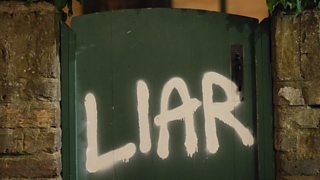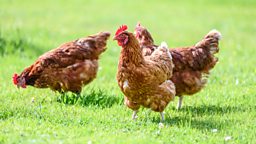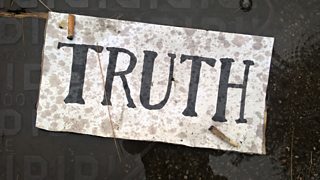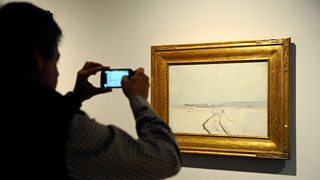How to tell if someone is lying to you
In Power of Deceit, Lucy Cooke sets out to discover why underhand behaviour is rife throughout the animal kingdom and when it comes to social creatures like we humans, lying – or at least those little white lies – may be the social glue that binds us all together.
She also learns that, though we’re not very good at lie detecting, there might just be a simple trick to help you spot the fibbers amongst us…

We corrupt the truth to keep the peace
Often what we mean by “lying” is someone setting out to deceive us with their words or their actions. But, in fact, normal conversation can only really happen because we don’t say exactly what we really think or mean. Imagine if in every chat you had, the person you were talking to said what they really thought about you and your life decisions? It would be unbearable. Even if we vehemently dislike someone’s new, expensive handbag, most of us wouldn’t dream of revealing that. Because surely being truthful does more harm than good? This kind of cooperation is at the heart of a lot of human social interactions.
Deception is the glue that holds us all together, oils the cogs of cooperation, and keeps the world a harmonious place.
A third of us lie every day
“Round about a third of the population tell a serious lie each day,” says psychologist Richard Wiseman. And yet a recent survey showed that five percent of the population claim never to have lied at all. Seems many of us can’t even tell the truth in an anonymous survey…
-
![]()
Power of Deceit
Lucy Cooke discovers why being a bit sneaky may be an excellent evolutionary strategy.
Are you a natural born liar?

Professor Richard Wiseman reveals some fascinating facts and an experiment you can do.
Prisoners are better at lie detecting than judges
“We’re pretty good at lying; we’re very bad at lie detecting,” Richard goes on to say.
We think we’re good at spotting deceit, but when you get two people into the lab and show them one video where a person is lying and one where they are telling the truth, and then ask the participant which is which, only around 50 percent of them will get it right. And that’s true of police, lawyers and even judges. There is just one group that out performs everyone else, and that’s prisoners.
To tell if someone is lying, use your ears not your eyes
The reason we’re not very good at lie detecting is because we’re visual creatures. Big parts of our brain are dedicated to visual processing and so we tend to rely on these cues when trying to detect if someone is telling a lie: are they moving around in their seat? Are they gesturing? What are their facial expressions like? However, most of those things are pretty controllable. Good liars control the channel that is being used by the other person to try and detect the lie.
Why do children lie?

Psychotherapist Philippa Perry delves into the world of childhood deception.
The signals outside of that are the verbal ones: the way we say things, and what we say. Liars, in general, say less; they tend to have a longer response latency (which is the time between the end of the question and the start of the answer); and there also tends to be an emotional distance in the lie, so the words “me”, “my” and “I” tend to drop away. It’s much harder for liars to control what they’re saying and how they’re saying it, so if you focus your attention there, and you know what patterning to look for, you become a much better lie detector.
To see if you’re a good liar, draw a Q on your forehead
Some of us are better liars than others, and Richard Wiseman has a test for distinguishing between the two groups.
Liars, in general, say less. They take longer to respond and their use of words like 'me', 'my' and 'I' tend to drop away.
Extend the first finger on your dominant hand, and draw a capital Q on your forehead. The question is, did you put the tail of the Q over your right eye or your left eye? Are you drawing the Q so that someone who’s looking at you could read it, or so that you could read it yourself?
The theory goes that if you put the tail over your left eye, so people facing you could read it, you’re always thinking about how other people are perceiving you and therefore you should be a good liar. If you put it over your right eye, you’re seeing the world from your own point of view, so you tend to be a little more honest.
The natural world is crammed full of con artists
Deception is everywhere. In the natural world, animals are constantly deceiving each other with camouflage and behaviour in order to pass on their genes.
Take the squid that impersonates a female in order to sneak past the dominant male, only to flash its sexual signal on the side of its body that’s hidden from its rival. And never trust a chicken… Cocks will get females to come running by falsely making the cluck that advertises food. Then, when there is none, hoodwink them into having sex instead of dinner.
Seabirds will often be in pair bonds for most of their lifetime, and we used to think that meant they were staying faithful. But scientists learnt that even birds that mate for life, like the guillemot, will engage in sneaky, extra pair copulation if they think they can improve their chances of producing more or better-quality offspring.

We have a long history of tactical deception
Lying is a really important part of being able to navigate large, complex social worlds. For primates like chimpanzees, being in a big group has huge advantages: you can share the responsibility of hunting for food, and there are more eyes for spotting predators. But if you’re then in competition with others to eat the food you’ve just caught together it can lead to fights where you or another individual get injured, and that’s extremely costly for the group. So being sneaky is actually better for you and for everyone else.
Tactical deception has a long history in the evolution of social species. An advanced society that gets along in a harmonious fashion is one that tells fibs to each other. And studies have shown, the more sophisticated the animal, the more common-place the con-games.
Of course, as we’ve learnt, being a liar might not always be such a bad thing. Without lying, we wouldn’t be here today; it’s actually crucial for our survival. But then, a liar would say that, wouldn’t they?
-
![]()
Power of Deceit
Lucy Cooke discovers why being a bit sneaky may be an excellent evolutionary strategy.
-
![]()
A Brief History of the Truth
The truth is like a vegetable your mother makes you eat, nourishing but it tastes terrible.
-
![]()
In Our Time: Truth
Melvyn Bragg and guests discuss philosophical approaches to truth.
-
![]()
Bringing Up Britain: Liar Liar
Mariella Frostrup asks how best to raise children into a post-truth world.




